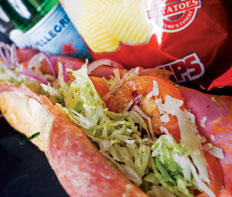Taylor Gourmet shows just how far Philadelphia natives will go to recapture the sandwiches of their youth. The deli and market concept was created by friends David Mazza and Casey Patten after they graduated from Penn State, moved to Washington, D.C., and started craving a taste of home.
“We missed the flavor of a really good hoagie with good crusty bread,” Mazza says.
So, after a few years of sandwich research, the two purchased a run-down, three-story building in D.C.’s Atlas District, an area devastated by the 1968 riots that was reinvented in the past decade as an arts, entertainment, and dining hotspot.
Mazza and Patten renovated the second and third floors of the building into two 850-square-foot apartments—one for each of them—and turned the first-floor retail space into a gourmet Italian deli and market, borrowing Patten’s middle name for the business moniker. They opened that first location in November 2008 and a second location in CityVista, another up-and-coming D.C. neighborhood, just shy of a year later.
“We are currently looking to expand by putting our brand in a couple other neighborhoods in the District, and we’re looking at Bethesda, Maryland,” Mazza says. “But right now we want to focus on picking up new locations ourselves. We’re very hands-on, each working 60 or 70 hours a week. Every day you’ll find Casey and myself at the restaurants, either working on the line or at a cash register. The result of being hands-on is that our quality is the best it’s ever been. Giving it to a franchisee—I don’t know if we’d be able to maintain the same quality.”
Part of that quality, Mazza says, comes from the bread the sandwiches are served on, which is driven in daily from Sarcone’s Bakery in Philadelphia. They also sell only Pennsylvania-made Herr’s potato chips and soda from Boylan Bottling Company in New Jersey rather than Coke or Pepsi products.
As for the sandwiches, the best seller by far, Mazza says, is the 9th Street Italian, a classic Italian hoagie made with imported Genoa salami, capicola, prosciutto, and sharp provolone cheese aged 18 months. It’s served on the crusty seeded Philadelphia bread with shredded lettuce, red onion, Roma tomato slices, olive oil, and Italian seasoning.
“We don’t offer mustard or mayo in our shops,” Mazza says. “Some people complain at first, and then they try it and either love it or they don’t come back. Most of them come back.”
Taylor Gourmet
Co-owners: David Mazza and Casey Patten
HQ: Washington, D.C.
Year Started: 2008
Annual Sales: $3 million
Total units: 2
Franchise units: 0
www.taylorgourmet.com
Several other hoagies on the menu—most priced at $6.90 for a six-inch and $8.90 for a 12-inch—are made with a variety of imported Italian meats and cheeses, which are also available for purchase in the small retail market that occupies part of each Taylor location. Turkey, a key ingredient in the Philadelphia Landfill hoagie that also includes imported ham, Genoa salami, roasted red peppers, and sharp provolone, is roasted in house. The Landfill is $7.30 for the six-inch and $9.30 for the 12-inch.
Another specialty at Taylor Gourmet is the chicken cutlet creations.
“We pan sauté white meat chicken breast breaded in house,” Mazza says.
These chicken cutlets are then used in sandwiches like the Broad Street made with chicken, broccoli-rabe, and sharp provolone, or the Island Avenue, which tops the chicken with arugula, pesto, and brie.
“We tweak Italian old-school deli to fit the D.C. appetite,” Mazza says, “adding ingredients like arugula and brie.”
Another popular tweaked Italian item is the Risotto Ball, which is homemade risotto that’s breaded and deep fried. The Risotto Ball accompanies mozzarella sticks and deep-fried ravioli as hot appetizer selections on the Taylor Gourmet menu.
While the homemade menu selections are a draw for D.C. foodies, architecture buffs come to check out the original location. The transformation of this abandoned barbershop into a contemporary, industrial-style dining and living space was covered by both Dwell magazine and the Washington Chapter of the American Institute of Architects. But the renovation wasn’t just hip—it was also green, with shelving and walls made from recycled wood pallets finished with soy-based sealants. Energy-efficient heating and cooling systems and lighting were also priorities.
Another architectural feature of Taylor Gourmet was designed to circumvent an ordinance that does not allow sidewalk dining in the Taylor locations. Each restaurant’s front window is an overhead garage door that can be rolled up for instant al fresco dining, albeit indoor.
Taylor Gourmet—which does about 20 percent of business in catering and delivery—is open for lunch and dinner seven days a week at both locations. It stays open until the wee morning hours on weekends because, despite an average ticket of $12–$13 per person, the deli attracts a late-night crowd and has a reputation for sophistication.
“Somebody named us the No. 1 date spot in the district,” Mazza says. “We’re not just a place for lunch. People come here for a nice dinner.”









